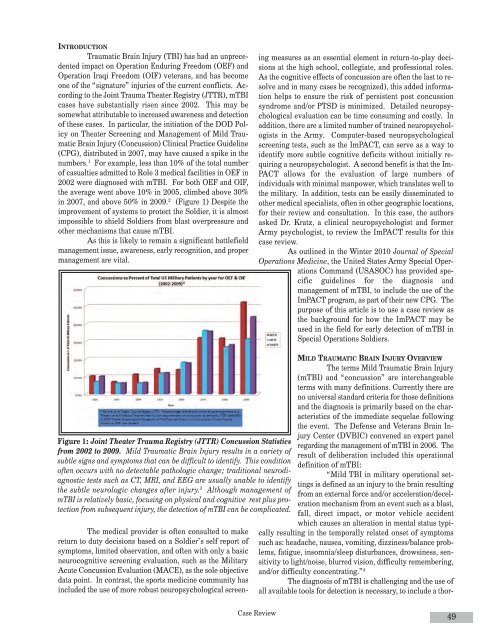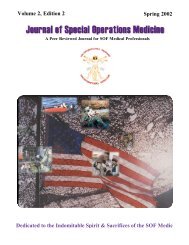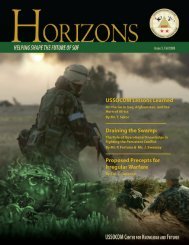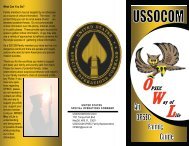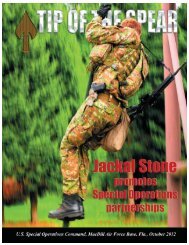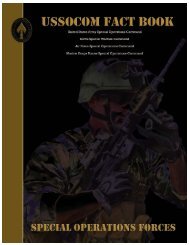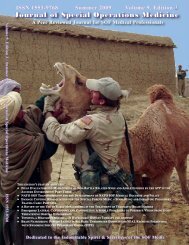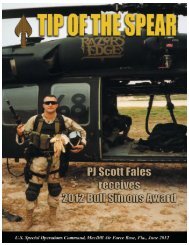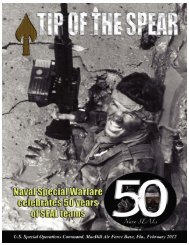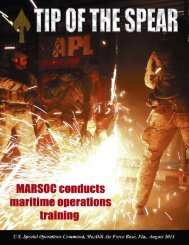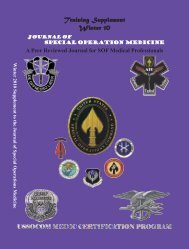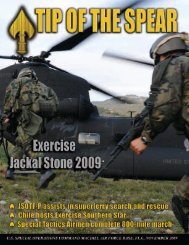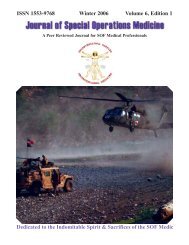Fall - United States Special Operations Command
Fall - United States Special Operations Command
Fall - United States Special Operations Command
You also want an ePaper? Increase the reach of your titles
YUMPU automatically turns print PDFs into web optimized ePapers that Google loves.
INTRODUCTION<br />
Traumatic Brain Injury (TBI) has had an unprecedented<br />
impact on Operation Enduring Freedom (OEF) and<br />
Operation Iraqi Freedom (OIF) veterans, and has become<br />
one of the “signature” injuries of the current conflicts. According<br />
to the Joint Trauma Theater Registry (JTTR), mTBI<br />
cases have substantially risen since 2002. This may be<br />
somewhat attributable to increased awareness and detection<br />
of these cases. In particular, the initiation of the DOD Policy<br />
on Theater Screening and Management of Mild Traumatic<br />
Brain Injury (Concussion) Clinical Practice Guideline<br />
(CPG), distributed in 2007, may have caused a spike in the<br />
numbers. 1 For example, less than 10% of the total number<br />
of casualties admitted to Role 3 medical facilities in OEF in<br />
2002 were diagnosed with mTBI. For both OEF and OIF,<br />
the average went above 10% in 2005, climbed above 30%<br />
in 2007, and above 50% in 2009. 2 (Figure 1) Despite the<br />
improvement of systems to protect the Soldier, it is almost<br />
impossible to shield Soldiers from blast overpressure and<br />
other mechanisms that cause mTBI.<br />
As this is likely to remain a significant battlefield<br />
management issue, awareness, early recognition, and proper<br />
management are vital.<br />
Figure 1: Joint Theater Trauma Registry (JTTR) Concussion Statistics<br />
from 2002 to 2009. Mild Traumatic Brain Injury results in a variety of<br />
subtle signs and symptoms that can be difficult to identify. This condition<br />
often occurs with no detectable pathologic change; traditional neurodiagnostic<br />
tests such as CT, MRI, and EEG are usually unable to identify<br />
the subtle neurologic changes after injury. 3 Although management of<br />
mTBI is relatively basic, focusing on physical and cognitive rest plus protection<br />
from subsequent injury, the detection of mTBI can be complicated.<br />
The medical provider is often consulted to make<br />
return to duty decisions based on a Soldier’s self report of<br />
symptoms, limited observation, and often with only a basic<br />
neurocognitive screening evaluation, such as the Military<br />
Acute Concussion Evaluation (MACE), as the sole objective<br />
data point. In contrast, the sports medicine community has<br />
included the use of more robust neuropsychological screen-<br />
Case Review<br />
ing measures as an essential element in return-to-play decisions<br />
at the high school, collegiate, and professional roles.<br />
As the cognitive effects of concussion are often the last to resolve<br />
and in many cases be recognized), this added information<br />
helps to ensure the risk of persistent post concussion<br />
syndrome and/or PTSD is minimized. Detailed neuropsychological<br />
evaluation can be time consuming and costly. In<br />
addition, there are a limited number of trained neuropsychologists<br />
in the Army. Computer-based neuropsychological<br />
screening tests, such as the ImPACT, can serve as a way to<br />
identify more subtle cognitive deficits without initially requiring<br />
a neuropsychologist. A second benefit is that the Im-<br />
PACT allows for the evaluation of large numbers of<br />
individuals with minimal manpower, which translates well to<br />
the military. In addition, tests can be easily disseminated to<br />
other medical specialists, often in other geographic locations,<br />
for their review and consultation. In this case, the authors<br />
asked Dr. Kratz, a clinical neuropsychologist and former<br />
Army psychologist, to review the ImPACT results for this<br />
case review.<br />
As outlined in the Winter 2010 Journal of <strong>Special</strong><br />
<strong>Operations</strong> Medicine, the <strong>United</strong> <strong>States</strong> Army <strong>Special</strong> <strong>Operations</strong><br />
<strong>Command</strong> (USASOC) has provided specific<br />
guidelines for the diagnosis and<br />
management of mTBI, to include the use of the<br />
ImPACT program, as part of their new CPG. The<br />
purpose of this article is to use a case review as<br />
the background for how the ImPACT may be<br />
used in the field for early detection of mTBI in<br />
<strong>Special</strong> <strong>Operations</strong> Soldiers.<br />
MILD TRAUMATIC BRAIN INJURY OVERVIEW<br />
The terms Mild Traumatic Brain Injury<br />
(mTBI) and “concussion” are interchangeable<br />
terms with many definitions. Currently there are<br />
no universal standard criteria for those definitions<br />
and the diagnosis is primarily based on the characteristics<br />
of the immediate sequelae following<br />
the event. The Defense and Veterans Brain Injury<br />
Center (DVBIC) convened an expert panel<br />
regarding the management of mTBI in 2006. The<br />
result of deliberation included this operational<br />
definition of mTBI:<br />
“Mild TBI in military operational settings<br />
is defined as an injury to the brain resulting<br />
from an external force and/or acceleration/deceleration<br />
mechanism from an event such as a blast,<br />
fall, direct impact, or motor vehicle accident<br />
which causes an alteration in mental status typically<br />
resulting in the temporally related onset of symptoms<br />
such as: headache, nausea, vomiting, dizziness/balance problems,<br />
fatigue, insomnia/sleep disturbances, drowsiness, sensitivity<br />
to light/noise, blurred vision, difficulty remembering,<br />
and/or difficulty concentrating.” 4<br />
The diagnosis of mTBI is challenging and the use of<br />
all available tools for detection is necessary, to include a thor-<br />
49


